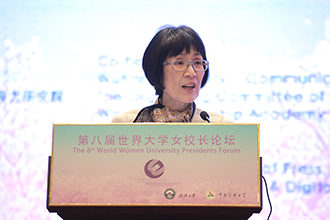
|
||||||||||||||||||||||||||||||||||||||||||||||||||||||||||||||||||||||||
| International Engagement Highlights |
|
Promoting Gender Equity in Universities:
The Role of Tertiary Educational Exchanges in the Belt and Road Initiative  Prof. Fanny M. Cheung, Pro-Vice-Chancellor of CUHK and Convenor of Policy Research @ HKIAPS, attended the 8th World Women University Presidents Forum in Wuhan, China from 8–10 April 2018. Over 150 female university presidents, senior members, specialists, and scholars from UNESCO and 51 countries and regions around the world were invited to attend the forum. Prof. Cheung delivered a speech titled “Promoting Gender Equity in Universities: The Role of Tertiary Educational Exchanges in the Belt and Road Initiative”. Prof. Cheung shared with the participants CUHK’s experiences and efforts to promote internationalization and gender equity.
Prof. Fanny M. Cheung, Pro-Vice-Chancellor of CUHK and Convenor of Policy Research @ HKIAPS, attended the 8th World Women University Presidents Forum in Wuhan, China from 8–10 April 2018. Over 150 female university presidents, senior members, specialists, and scholars from UNESCO and 51 countries and regions around the world were invited to attend the forum. Prof. Cheung delivered a speech titled “Promoting Gender Equity in Universities: The Role of Tertiary Educational Exchanges in the Belt and Road Initiative”. Prof. Cheung shared with the participants CUHK’s experiences and efforts to promote internationalization and gender equity.As a woman vice-president and a scholar in psychology and gender studies, Prof. Cheung stressed the role of tertiary educational exchanges in promoting gender equity. Education is critical for empowering women and achieving gender equity. Unfortunately, due to traditional, cultural, or economic reasons, women in some countries of the Belt and Road regions cannot enjoy equal educational opportunities. She urged universities to collaborate in examining the barriers to female participation in higher education. These barriers include the direct or indirect costs of schooling; traditional, cultural, or religious beliefs; health-related issues; crises, conflicts, or instability; the lack of a legal framework or enforcement; the lack of a quality curriculum or teaching materials; and poor accessibility in locations as well as transportation. Those collaborating in research on women’s education, through comparative studies, case studies, and the sharing of experiences, should be given support to achieve a comprehensive understanding of these obstacles. Prof. Cheung suggested various directions for promoting gender equity in the university and its internationalization efforts. First, university policies regarding discrimination and sexual harassment should be developed and disseminated. Senior management should be aware of the safety of students and staff in studying or working abroad and travelling across borders. Other important aspects include personal safety; freedom from discrimination and abuse; safety at work; personal and social networks; and cross-cultural relations. In particular, female students and staff are more vulnerable to sexual harassment, physical assaults, and sexual assaults. There have been incidents of female university students and staff encountering sexual harassment during their exchange programmes. Individual supervision and advice should be available for students who are preparing to start exchange programmes overseas. Cultural and gender sensitivity training should also be provided to members of the university. The university management should keep close connections to staff and students to increase their knowledge of their needs and problems. For example, the establishment and operation of international student organizations should be supported to enhance communication. In terms of practical measures, accommodation for international students at the university can be located on or near the campus. The university can make it mandatory for landlords to register student housing, and conduct regular inspections. Facilities such as health and counselling services should be provided for incoming students, as an early point of intervention in case of risk or difficulties. Universities around the world are promoting international exchanges. Senior management in tertiary educational institutions should take the lead to heighten awareness on the university’s role in promoting gender equity not only at home, but also across geographical borders. ■ |
